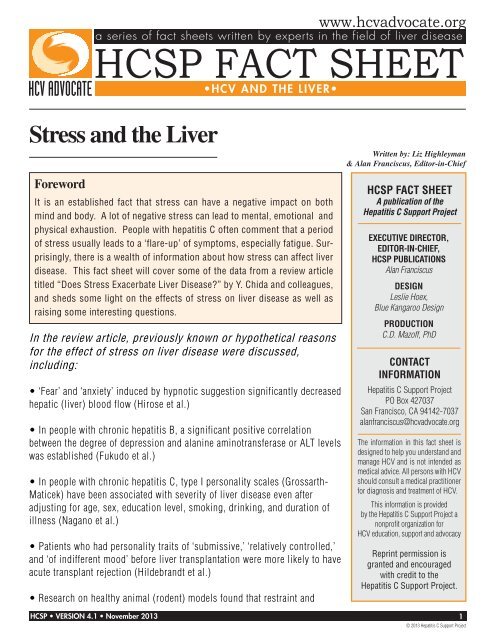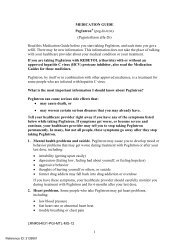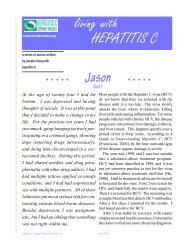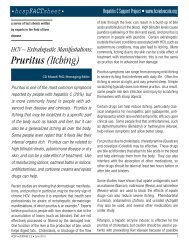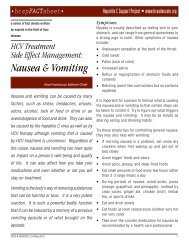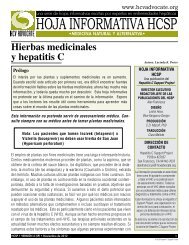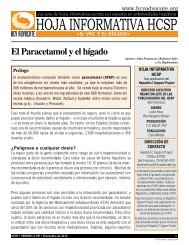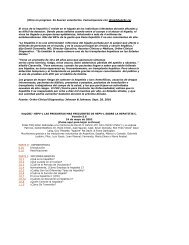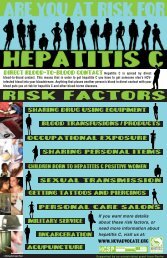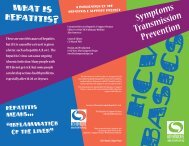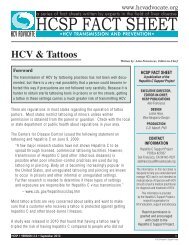The Liver: Stress and the Liver - HCV Advocate
The Liver: Stress and the Liver - HCV Advocate
The Liver: Stress and the Liver - HCV Advocate
Create successful ePaper yourself
Turn your PDF publications into a flip-book with our unique Google optimized e-Paper software.
<strong>Stress</strong> <strong>and</strong> <strong>the</strong> <strong>Liver</strong><br />
Foreword<br />
a series of fact sheets written by experts in <strong>the</strong> field of liver disease<br />
HCSP FACT SHEET<br />
•<strong>HCV</strong> AND THE LIVER•<br />
It is an established fact that stress can have a negative impact on both<br />
mind <strong>and</strong> body. A lot of negative stress can lead to mental, emotional <strong>and</strong><br />
physical exhaustion. People with hepatitis C often comment that a period<br />
of stress usually leads to a ‘flare-up’ of symptoms, especially fatigue. Surprisingly,<br />
<strong>the</strong>re is a wealth of information about how stress can affect liver<br />
disease. This fact sheet will cover some of <strong>the</strong> data from a review article<br />
titled “Does <strong>Stress</strong> Exacerbate <strong>Liver</strong> Disease” by Y. Chida <strong>and</strong> colleagues,<br />
<strong>and</strong> sheds some light on <strong>the</strong> effects of stress on liver disease as well as<br />
raising some interesting questions.<br />
In <strong>the</strong> review article, previously known or hypo<strong>the</strong>tical reasons<br />
for <strong>the</strong> effect of stress on liver disease were discussed,<br />
including:<br />
• ‘Fear’ <strong>and</strong> ‘anxiety’ induced by hypnotic suggestion significantly decreased<br />
hepatic (liver) blood flow (Hirose et al.)<br />
• In people with chronic hepatitis B, a significant positive correlation<br />
between <strong>the</strong> degree of depression <strong>and</strong> alanine aminotransferase or ALT levels<br />
was established (Fukudo et al.)<br />
• In people with chronic hepatitis C, type I personality scales (Grossarth-<br />
Maticek) have been associated with severity of liver disease even after<br />
adjusting for age, sex, education level, smoking, drinking, <strong>and</strong> duration of<br />
illness (Nagano et al.)<br />
• Patients who had personality traits of ‘submissive,’ ‘relatively controlled,’<br />
<strong>and</strong> ‘of indifferent mood’ before liver transplantation were more likely to have<br />
acute transplant rejection (Hildebr<strong>and</strong>t et al.)<br />
• Research on healthy animal (rodent) models found that restraint <strong>and</strong><br />
www.hcvadvocate.org<br />
Written by: Liz Highleyman<br />
& Alan Franciscus, Editor-in-Chief<br />
HCSP FACT SHEET<br />
A publication of <strong>the</strong><br />
Hepatitis C Support Project<br />
EXECUTIVE DIRECTOR,<br />
EDITOR-IN-CHIEF,<br />
HCSP PUBLICATIONS<br />
Alan Franciscus<br />
DESIGN<br />
Leslie Hoex,<br />
Blue Kangaroo Design<br />
PRODUCTION<br />
C.D. Mazoff, PhD<br />
CONTACT<br />
INFORMATION<br />
Hepatitis C Support Project<br />
PO Box 427037<br />
San Francisco, CA 94142-7037<br />
alanfranciscus@hcvadvocate.org<br />
<strong>The</strong> information in this fact sheet is<br />
designed to help you underst<strong>and</strong> <strong>and</strong><br />
manage <strong>HCV</strong> <strong>and</strong> is not intended as<br />
medical advice. All persons with <strong>HCV</strong><br />
should consult a medical practitioner<br />
for diagnosis <strong>and</strong> treatment of <strong>HCV</strong>.<br />
This information is provided<br />
by <strong>the</strong> Hepatitis C Support Project a<br />
nonprofit organization for<br />
<strong>HCV</strong> education, support <strong>and</strong> advocacy<br />
Reprint permission is<br />
granted <strong>and</strong> encouraged<br />
with credit to <strong>the</strong><br />
Hepatitis C Support Project.<br />
HCSP • VERSION 4.1 • November 2013<br />
1<br />
© 2013 Hepatitis C Support Project
HCSP FACT SHEET<br />
<strong>HCV</strong> – <strong>Stress</strong> <strong>and</strong> <strong>the</strong> <strong>Liver</strong><br />
•<strong>HCV</strong> AND THE LIVER•<br />
a series of fact sheets written by experts in <strong>the</strong> field of liver disease<br />
electric foot-shock stress triggered slightly elevated<br />
ALT levels (Fernadez et al, Chida et al.)<br />
<strong>The</strong> authors went on to describe <strong>the</strong> possible<br />
links between stress <strong>and</strong> liver disease that might<br />
influence liver injury:<br />
• <strong>The</strong> release of glucocorticoids (cortisol in<br />
humans, corticosterone in rodents) controls <strong>the</strong><br />
homeostasis (steady or healthy state) of each organ.<br />
In corticosterone pretreated mice, it was found<br />
that “a remarkable exacerbation of liver injury”<br />
occurred.<br />
• During stress, natural killer cells (NKT) are<br />
exp<strong>and</strong>ed in <strong>the</strong> liver <strong>and</strong>, in some of <strong>the</strong>se cases,<br />
contributed to liver cell death <strong>and</strong> worsening of<br />
liver disease.<br />
• In <strong>the</strong> part of <strong>the</strong> brain that controls <strong>the</strong> liver,<br />
stress was found to impair blood flow <strong>and</strong> may lead<br />
to or trigger liver damage.<br />
• <strong>Stress</strong> can exert a dual effect (enhancement or<br />
reduction) of <strong>the</strong> inflammatory process that takes<br />
place in <strong>the</strong> liver.<br />
• A certain nerve (vagus) from <strong>the</strong> brain to <strong>the</strong> liver<br />
when stimulated with anti-stress <strong>the</strong>rapy (hypnosis,<br />
meditation, acupuncture) may actually improve or<br />
reduce <strong>the</strong> negative effect of stress on <strong>the</strong> liver.<br />
<strong>The</strong> authors concluded that even though all of<br />
<strong>the</strong> interactions between stress <strong>and</strong> <strong>the</strong> liver are<br />
not completely understood <strong>the</strong>re appears to be<br />
a negative association between stress on liver<br />
disease progression. <strong>The</strong> authors noted that <strong>the</strong><br />
link between liver disease <strong>and</strong> stress needs to be<br />
identified so that “physicians <strong>and</strong> o<strong>the</strong>r healthcare<br />
practitioners would be better able to treat liver<br />
disease by helping <strong>the</strong>ir patients learn coping <strong>and</strong><br />
relaxation skills.”<br />
HCSP • VERSION 4.1 • November 2013<br />
This is ano<strong>the</strong>r important piece of information for<br />
people living with hepatitis C to know in order<br />
to help keep <strong>the</strong> mind, body <strong>and</strong> liver healthy.<br />
Interestingly, <strong>the</strong> emotion that is attached to <strong>the</strong><br />
liver in Traditional Chinese Medicine is anger.<br />
<strong>Stress</strong>, depression <strong>and</strong> anger can go h<strong>and</strong> in h<strong>and</strong>.<br />
<strong>The</strong>re are many strategies that can help with dealing<br />
with stress, such as meditation, yoga, prayer <strong>and</strong><br />
acupuncture, to name a few. Hepatitis C support<br />
groups can also help by providing a place where we<br />
can talk about <strong>the</strong> complex issues of dealing with a<br />
chronic illness such as hepatitis C. <strong>The</strong> bottom line<br />
is that learning to control stress should be a high<br />
priority for anyone living with hepatitis C.<br />
<strong>Stress</strong> Busters<br />
For people living with hepatitis C managing stress<br />
is an important component of staying healthy.<br />
Living with hepatitis C is stressful in <strong>and</strong> of itself<br />
so reducing stress should be an important goal for<br />
everyone living with hepatitis C. Below are some<br />
helpful hints to control it.<br />
• Eat healthy <strong>and</strong> nutritious meals<br />
• Drink plenty of liquids<br />
• Exercise –one of <strong>the</strong> best strategies to staying<br />
healthy including controlling stress<br />
• Learn to meditate<br />
• Laugh as much as you can<br />
• Work on spoiling yourself with hobbies,<br />
massage, dining at favorite restaurants<br />
• Spending time with family <strong>and</strong> friends who have<br />
a positive outlook on life<br />
References<br />
“Does <strong>Stress</strong> Exacerbate <strong>Liver</strong> Disease,” Yoichi<br />
Chida, Nobuyuki Sudo <strong>and</strong> Chiharu Kubo. Journal<br />
of Gastroenterology <strong>and</strong> Hepatology 20 (2006) 202-<br />
208<br />
2<br />
© 2013 Hepatitis C Support Project
HCSP FACT SHEET<br />
<strong>HCV</strong> – <strong>Stress</strong> <strong>and</strong> <strong>the</strong> <strong>Liver</strong><br />
•<strong>HCV</strong> AND THE LIVER•<br />
a series of fact sheets written by experts in <strong>the</strong> field of liver disease<br />
• <strong>The</strong> American Institute of <strong>Stress</strong><br />
www.stress.org<br />
• Mayo Clinic<br />
www.mayoclinic.com/health/<br />
stress-management/MY00435<br />
• Medline<br />
www.nlm.nih.gov/medlineplus/<br />
stress.html<br />
Related Publications<br />
• <strong>HCV</strong> Wellness: Encouraging Words for Difficult Times<br />
www.hcvadvocate.org/hepatitis/factsheets_pdf/Encouraging_Words.pdf<br />
• <strong>HCV</strong> Wellness: Meditation<br />
www.hcvadvocate.org/hepatitis/factsheets_pdf/Meditation.pdf<br />
• <strong>HCV</strong> Wellness: <strong>Stress</strong> Reduction<br />
www.hcvadvocate.org/hepatitis/factsheets_pdf/<strong>Stress</strong>_Reduction.pdf<br />
For more information<br />
Glossary of Terms<br />
• Self-Care for Hepatitis C:<br />
Applied Meditation for a Healthy<br />
<strong>Liver</strong> CD, by Margo Adair <strong>and</strong><br />
Robin Roth<br />
www.hepCmeditations.org<br />
ALANINE AMINOTRANSFERASE<br />
(ALT; FORMERLY SGPT):<br />
An enzyme produced in <strong>the</strong> liver<br />
when <strong>the</strong> membranes of liver<br />
cells break down. ALT levels are<br />
measured to help assess <strong>the</strong> degree<br />
of liver damage.<br />
NATURAL KILLER (NK) CELL:<br />
A type of white blood cell that<br />
attacks <strong>and</strong> kills cells infected with<br />
microorganisms <strong>and</strong> tumor cells.<br />
INFLAMMATION:<br />
<strong>The</strong> body’s response to tissue injury<br />
or infection, typically characterized<br />
by redness, swelling, heat, <strong>and</strong> pain.<br />
VAGUS NERVE:<br />
A nerve that extends from <strong>the</strong> brain<br />
to <strong>the</strong> abdomen. It serves nerve<br />
fibers to <strong>and</strong> from <strong>the</strong> throat, voice<br />
box, trachea, lungs, heart, <strong>and</strong><br />
intestinal tract.<br />
Visit our websites to learn more about<br />
viral hepatitis:<br />
www.hcvadvocate.org • www.hbvadvocate.org<br />
www.hepatitistattoos.org<br />
HCSP • VERSION 4.1 • November 2013<br />
3<br />
© 2013 Hepatitis C Support Project


